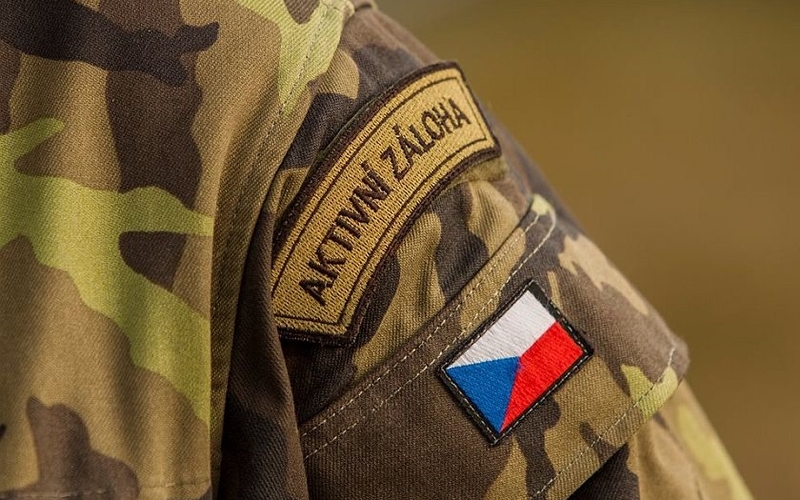Active Reserve soldiers to get new gear this year, may also be deployed again against covid
According to recent information published by the Army of the Czech Republic on its website, Active Reserve soldiers will not only receive new modern helmets, ballistic vests or small arms, but also the motivational benefits for joining and serving in the Army will be updated, according to the ideas of the General Staff of the Czech Armed Forces.
The provision of the necessary equipment, not only the aforementioned, but also goretex suits, sleeping bags, car mattresses, etc., was set in motion mainly at the end of last year on the basis of numerous requests, which the leadership of the General Staff listened to. This year, all reservists, regardless of whether they serve in combat units or infantry companies of the Regional Military Commands, will be better off.
The first ballistic helmets (the same as the ones worn by conscripted soldiers) arrived to the active reserve last year and the wearers have been praising the helmets. Compared to the old, heavy and highly uncomfortable helmets, it is indeed a welcome change.

Picture: Active Reserve soldiers receive new equipment and armament (illustration photo) | Ministry of Defence of the Czech Republic
This year and next year, reservists should also receive new modern ballistic vests and CZ 805 BREN assault rifles, which will replace the outdated M. 58 „submachine guns“. The Active Reserve and Regional Military Commands should also receive the first new Toyota Hilux all-terrain vehicles.
The prospects for material provision are therefore positive. As regards the incentive benefits for joining and serving in Active Reserve, the question is what exactly the Army means by benefits. On its website, the Army puts: "By the end of the year, a new Concept of the Active Reserve of the Armed Forces of the Czech Republic 2030 should be approved by a government resolution. Among other things, it envisages a revision of the current incentive benefits for employers and reservists." What will be the subject of the revision of the current incentive benefits we will see exactly, but in any case the financial benefit or its increase would be a problem, given the current budget of the Army.
According to Brigadier General Lenka Šmerdová, advisor to the Chief of the General Staff of the Czech Armed Forces for the area of personnel replenishment, the current motivational benefits include the opportunity to actively participate in the defence of the homeland, but also to acquire new professional skills and knowledge that can be used not only in the army environment. Last but not least, people are also attracted by the possibility of serving abroad and interesting financial rewards. It is questionable whether it is active participation in the defence of the homeland that should be described as a benefit, as current and potential active reserve soldiers see it as the main reason for joining the Army rather than as a benefit.
It is then worth considering that the Active Reserve units (both combat units and infantry companies in the Regional Military Command) have a major problem with the equipment they practically do not have (e.g. Pandurs in combat units). This then leads to the problem that active reserve soldiers in combat formations often have a problem training specializations for these vehicles (driver, gunner-operator, commander, etc.). Equally problematic is the length of most courses that are built for career soldiers. Thus, a member of the Active Reserve basically has no chance to complete some courses because the maximum number of days to train in a year, as specified by law, is insufficient to do so.
The bureaucratic requirements for Active Reserve soldiers in command positions are then another thing that bothers reservists. Of course, it is not possible to exclude from Active Reserve training, for example, 'command training paperwork' (method sheets, etc.), but it must be realised that this time is then noticeably lacking in the already almost insufficient time devoted to practical training. The solution could then be to reduce the 'paperwork' or to extend the time during which a member of the Active Reserve is legally allowed to train.
According to the available information, there is also a long-term lack of sufficient number of instructors for their specific activities (construction of check point, protection and security of strategic object), especially for Regional Military Commands.
It should be remembered that at present the Czech Army is dealing with more substantial and serious problems, however, it is also good to take into account what our reservists are concerned about.
Since last year the soldiers of the Active Reserve, during their deployment at the National Vaccination Centre O2 universum, clearly showed that they are capable of completing the ranks of professional soldiers and becoming their equal partners, they are counted on in the future if necessary.
In addition to the deployment mentioned above, other Active Reserve members have volunteered to fight the coronavirus, for which they deserve great thanks.



















